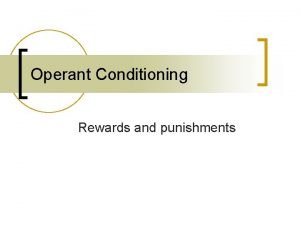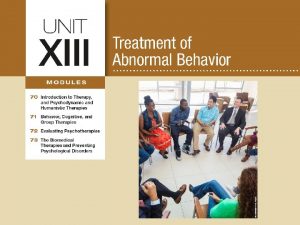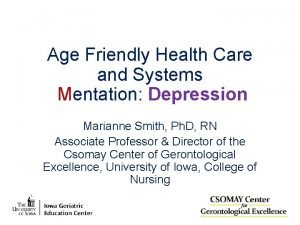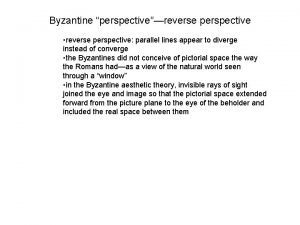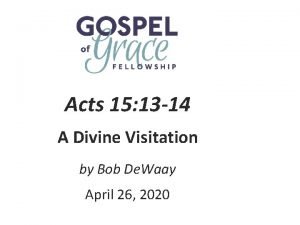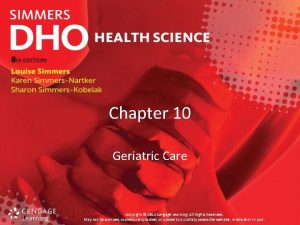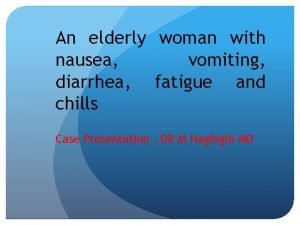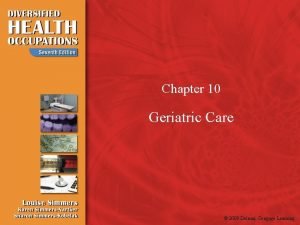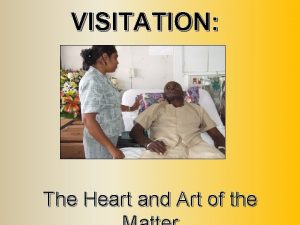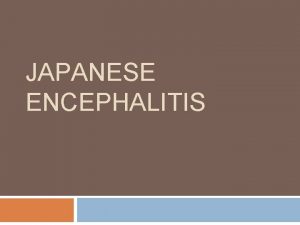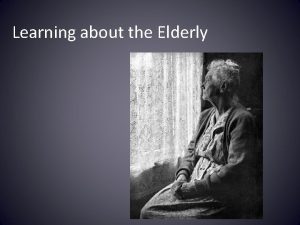JAPANESE GARDEN VISITATION AND MILDLY DEPRESSED ELDERLY A

















- Slides: 17

JAPANESE GARDEN VISITATION AND MILDLY DEPRESSED ELDERLY: A STUDY AND APPLICATIONS Tom Gregersen Cultural Director Morikami Museum & Japanese Gardens Larry Rosensweig President LFR Consulting

The Morikami Museum And Japanese Gardens And The Christine E. Lynn College Of Nursing, Florida Atlantic University Funded In Part By The Institute Of Museum And Library Services

COMMUNITY NEED • Depression in older Americans is a common problem • 15 to 20% of older Americans suffer from some form of depression (American Association for Geriatric Psychiatry, National Institute of Mental Health) • Depression is associated with greater health care costs, poorer health outcomes, and increased mortality

THE GARDEN AS A MOOD-ALTERING ENVIRONMENT • Anecdotal: Visitors to The Morikami report relief of anxiety, symptoms of depression when visiting the garden • The “Healing Garden”: Viewing natural scenes fosters stress recovery (Ulrich, Texas A&M University) • 800 years ago monks designed gardens for “spiritual transition” (Ulrich)

DESIGNED BY HOICHI KURISU AS HEALING GARDEN • “Kurisu garden designs bring balance to hearts and minds by providing exceptional public and private spaces in which to engage with nature” urisu. com www. k

HYPOTHESIS • Walking in a garden environment on a regular basis or as part of a regular program will have benefits similar to those of art therapy in relieving symptoms of depression among elders

THE STUDY: AN OVERVIEW • Participants were randomly divided among three groups • Group I: Participants walked the garden on their own • Group II: Participants walked the garden with a trained therapist providing “guided imagery” • Group III: Participants engaged in art therapy

THE STUDY • 3 six-week sessions • 58 participants/subjects • Pre-intervention data collection to determine severity of depression

GROUP I: WALKED ALONE • Met twice weekly on days different from guided imagery group • Participants were greeted individually in the museum lobby by the researcher • After signing an attendance record, each was free to walk the garden at his or her own pace • Some took 45 minutes, others all morning

GROUP II: GUIDED IMAGERY • Met at The Morikami twice weekly • Met in the museum lobby by the guided imagery leader • Began each session with stretching exercises • Walked the garden as a group, with “guided imagery” • Each session lasted approx 2 hours

GROUP III: ART THERAPY • Met twice weekly for art classes away from The Morikami • Sessions lasted 2 hours

STUDY RESULTS • Symptoms of depression decreased over the period of the study • Both independent walking and walking with guided imagery were as successful as art therapy, but not more successful • Walking with guided imagery was slightly more successful than independent walking

MORE FINDINGS FROM THE STUDY • Walking in the garden by itself positively impacts individuals • Telling or writing personal stories helps more • A series of walking sessions is more effective than one or just a few sessions • Structure helps provide discipline to continue garden walking sessions

STROLL FOR WELL-BEING • Morikami developed new program • Does not require mental health professionals’ regular involvement • Designed and tested with FAU College of Nursing researchers

STROLL FOR WELL-BEING • Series of 12 walking sessions begins with introductory meeting, mid-term and final meetings • Participants pay fee which includes membership and gives free access • Offering program this fall to group of highly stressed teachers

THE JOURNAL • Allows users to record personal thoughts and observations • Provides scripts for 12 guided imagery tours

FOR MORE INFORMATION www. morikami. org or e-mail morikami@pbcgov. com
 U vegetable
U vegetable Mild dyslexia
Mild dyslexia Operant vs classical
Operant vs classical John donne a valediction forbidding mourning
John donne a valediction forbidding mourning Annunciation and visitation reims cathedral
Annunciation and visitation reims cathedral Annunciation and visitation reims cathedral
Annunciation and visitation reims cathedral Dr carlson advises his depressed patients
Dr carlson advises his depressed patients We had ... horrible day that we felt depressed
We had ... horrible day that we felt depressed Depressed mentation
Depressed mentation Scapular region
Scapular region Gutter fracture
Gutter fracture Principles of church visitation
Principles of church visitation Reverse perspective byzantine art
Reverse perspective byzantine art Keys to divine visitation
Keys to divine visitation Supervised visitation center dc
Supervised visitation center dc Chapter 10:5 meeting the needs of the elderly
Chapter 10:5 meeting the needs of the elderly Nausea and vomiting in the elderly
Nausea and vomiting in the elderly Chapter 10:4 confusion and disorientation in the elderly
Chapter 10:4 confusion and disorientation in the elderly


